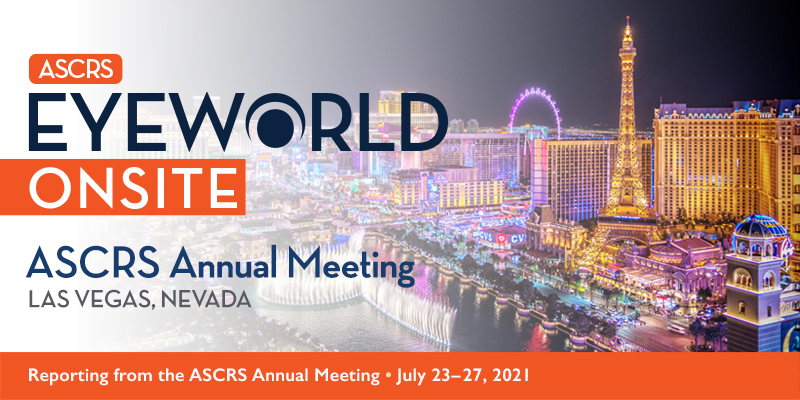
Sunday programming at the ASCRS Annual Meeting featured a general session and various symposia.
Former FDA commissioner gives insights on pandemic, lessons learned
Former FDA Commissioner Scott Gottlieb, MD, spoke in the Sunday General Session on the current status of the pandemic, how he thinks we got to where we are now, and lessons learned to avoid such a situation in the future.
In terms of the current delta variant, which is now the dominant COVID-19 variant in the U.S., Dr. Gottlieb said he thinks the country is further into this wave than we think. Assuming durability of the vaccines and the numbers of prior infections, Dr. Gottlieb said he thinks it will be hard to see successive waves of infection, meaning a significant percentage of the population will have some form of immunity.
Dr. Gottlieb said the coronavirus will become endemic.
“This will be a fact of life that we need to learn how to deal with,” he said, noting that boosters will likely be a part of the equation.
Dr. Gottlieb also highlighted what he considered some of the problems in early management of the pandemic. One was testing. We needed to get major manufacturers and clinical labs with testing capacity into the game earlier than agencies did. Without having adequate, widespread testing early on, Dr. Gottlieb said we didn’t know how much spread was underway, how heavily seeded the country was at the time.
Systemic problems like this at the agency level are what need to be addressed in the future to improve a response to threatening viruses. “We need an agency that is much more operationally focused with the ability to pull together different public health tools and think about public health preparation through the lens of national security,” he said. “The goal can’t just be to make sure the next pandemic isn’t so bad. … The goal has to be to make sure this doesn’t happen again.”
Inaugural Lindstrom Lecture
Elizabeth Yeu, MD, kicked off the second part of the Sunday General Session with an introduction of Richard Lindstrom, MD, highlighting his career and many accomplishments. “Today we honor one of the most influential contributors in ASCRS history,” she said, adding that Dr. Lindstrom has been at the forefront of ophthalmology’s revolutionary changes throughout his career. Among his contributions to ASCRS, she said, were to urge and guide the formation of the ASCRS non-profit foundation. He has a number of patents and has helped develop corneal preservation solutions, IOL technologies, and instruments.
In a video introduction, Dr. Lindstrom shared his family history and how he decided to get into medicine and ophthalmology. He highlighted how he built one of the first academic private practices in the country. Now, he spends much of his time in innovation as both an inventor and investor trying to find solutions to unmet needs.
The session went on to highlight different areas of Dr. Lindstrom’s many ophthalmic interests, with presentations on cornea, cataract, refractive, glaucoma, and the business of ophthalmology.
Edward Holland, MD, gave the Lindstrom Lecture on “A Corneal Odyssey: Challenges and Triumphs,” calling it “one of the highlights of my career.”
Dr. Holland began by discussing his career in ophthalmology, noting his first clinical rotation as a resident in 1981 on Dr. Lindstrom’s cornea service where Dr. Lindstrom was seeing around 100 patients a day for a variety of issues and researching a number of topics.
As a second-year resident, Dr. Lindstrom suggested Dr. Holland do a cornea fellowship elsewhere and return to join him on the cornea service at the University of Minnesota.
Dr. Holland went to the University of Iowa for his fellowship, but Dr. Lindstrom changed his mind, telling him that he couldn’t come back yet because he thought that Dr. Holland needed to do something different first. Instead, Dr. Holland did another fellowship at the National Eye Institute. Finally, back at University of Minnesota, Dr. Holland helped build the high-risk cornea service with Dr. Lindstrom.
“We had a lot of successes,” he said. “But we also had a lot of failures.” He mentioned two groups of high-risk corneal patients, immunologic and severe ocular surface disease.
Dr. Holland mentioned patients having persistent epithelial defects, corneal scarring and ulceration, conjunctivalization of the cornea, severe visual loss, and chronic pain. Primary keratoplasty fails in every case due to lack of corneal epithelialization, he said.
Dr. Holland also covered ocular surface stem cell transplantation tissue techniques, including autografts and allografts. Another challenge was that ocular surface rejection was causing a high failure rate.
The solution, he said, was to adopt and embrace systemic immunosuppression protocols, as are used in organ transplantation. He shared information on the history of immunosuppression and how to address some of the challenges of preventing rejection and reducing the side effects of immunosuppression. He mentioned utilizing more living donors and customizing immunosuppression.
In 2000, Dr. Holland moved to Cincinnati, which offered him a unique hybrid of academics and private practice. He described his collaboration in Cincinnati, work on ocular surface transplantations, and building of a team based on organ transplantation. One challenge, he said, is few surgeons will adopt what we do. A very small percentage of patients with LSCD are receiving OSST.
The concept of his “Cincinnati Protocol” includes adapting and embracing systematic immunosuppression; partnering with renal transplantation and adopting their principles; hiring a transplant coordinator; and building a team of specialists (cornea, glaucoma, retina, and ocular plastics).
Another project he collaborated recently with Dr. Lindstrom on was injectable endothelial cell therapy, which has the potential for one cornea to supply enough endothelial cells for hundreds of patients. This could change eye banking worldwide, Dr. Holland said, and could help solve world corneal blindness. He described the procedure and the history of research in this area. Dr. Holland and Dr. Lindstrom are now working with Aurion Biotech on this research.
Editors’ note: Dr. Holland, Dr. Lindstrom, and Dr. Yeu have financial interests with various ophthalmic companies.
Journal Club LIVE!
ASCRS Journal Club, typically a monthly, virtual ASCRS member offering, went live at the Annual Meeting. William Wiley, MD, presented the first paper “Comparative Study of Phacoemulsification Parameters With and Without Nitinol Filament Nuclear Disassembly.” The retrospective, comparative, consecutive case series evaluated the impact of miLOOP (Carl Zeiss Meditec) on phaco energy and phaco time. The study found that, overall, 16% less phaco energy was used with miLOOP (23% less phaco energy in denser, grade 3+/4+ cataracts) and 42% reduction in phaco time inside the eye.
Dr. Wiley said future helpful research could include a prospective study, a head-to-head comparison to other softening techniques, synergy analysis with other phaco aspiration techniques, and evaluation as to whether this would allow for development and/or adoption of other cataract removal techniques.
The second paper discussed by Thomas Meirick, MD, PGY-4, was “Effect of Residual Astigmatism on Uncorrected Visual Acuity and Patient Satisfaction in Pseudophakic Patients.” The goal of the study was to evaluate the effect of residual astigmatism on final uncorrected visual acuity and the effect of residual astigmatism on patient satisfaction.
The research extracted data from 34,891 eyes of 18,648 patients, 11,013 of whom had bilateral cataract surgery and completed questionnaires. More than 17,000 eyes had regression analysis data. The study found that more than 0.5 D of residual astigmatism was associated with increased chance of not achieving 20/20 UDVA and increased chance of the patient not being satisfied. Dr. Meirick said the axis of orientation of astigmatism was not an independent predictor of UDVA.
Editors’ note: Dr. Wiley has financial interests with various ophthalmic companies. Dr. Meirick has no relevant financial disclosures.
Other Sunday symposia
Leon Herndon, MD, said that the past year was unlike any other, not only with the COVID-19 pandemic but also the “pandemic of racism rearing its ugly head”—dual pandemics as Dr. Herndon put it, introducing the “Redefining Our Vision for Future Generations: Implicit Bias in Ophthalmology” symposium.
The past year has highlighted healthcare inequities with COVID-19, but previous studies have also shown inequity in care and within the medical profession. Dr. Herndon provided some of these examples. Benjamin Reese Jr., PsyD, gave a keynote lecture in the symposium ahead of an in-depth panel discussion.
This year’s ASCRS Government Relations Committee session, “In the Room Where it Happens,” featured Rep. Mariannette Miller-Meeks, MD (R-IA). The session was moderated by Parag Parekh, MD, with panelists Nancey McCann, Hayley Boling, MBA, COE, James Bryan, MD, and Dr. Meeks.
Dr. Miller-Meeks highlighted her story of getting involved in ophthalmology and in Congress. Throughout the session, the participants stressed the importance of reaching out to members of Congress to let them know of concerns and key issues, particularly those impacting patients and access to care.
Stay tuned for the September issue of EyeWorld for more on these symposia.
EyeWorld Onsite is a digital publication of the American Society of Cataract and Refractive Surgery.
For sponsorship opportunities or membership information, contact: ASCRS • 12587 Fair Lakes Circle • Suite 348 • Fairfax, VA 22033 • Phone: 703-591-2220 • Fax: 703-591-0614 • Email: ascrs@ascrs.org
Opinions expressed in EyeWorld Onsite do not necessarily reflect those of ASCRS. Mention of products or services does not constitute an endorsement by ASCRS.
Click here to view our Legal Notice.
Copyright 2021. All rights reserved.



